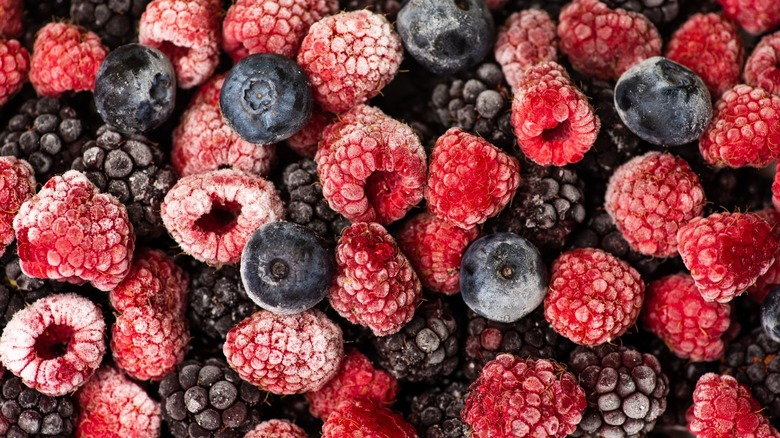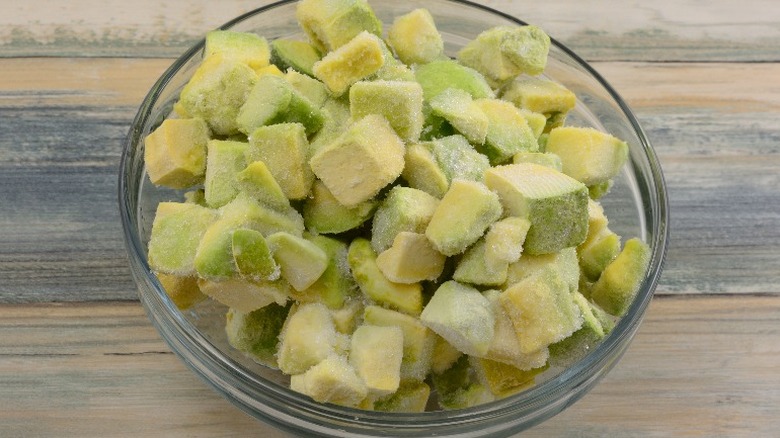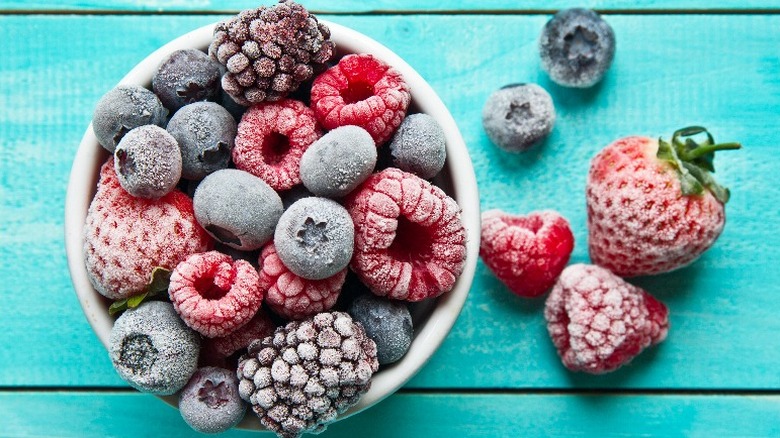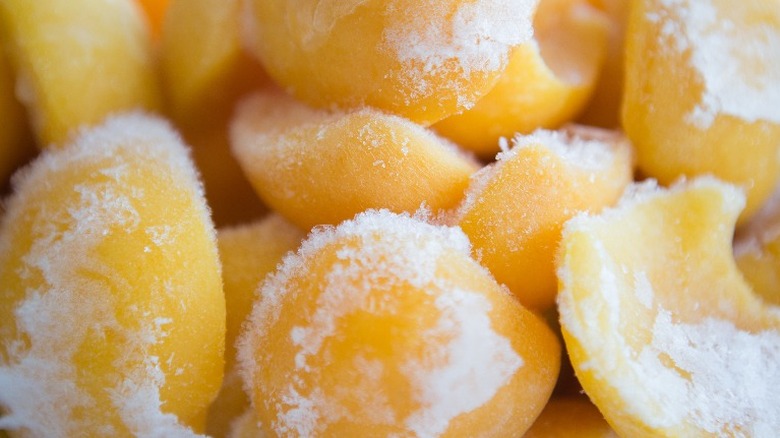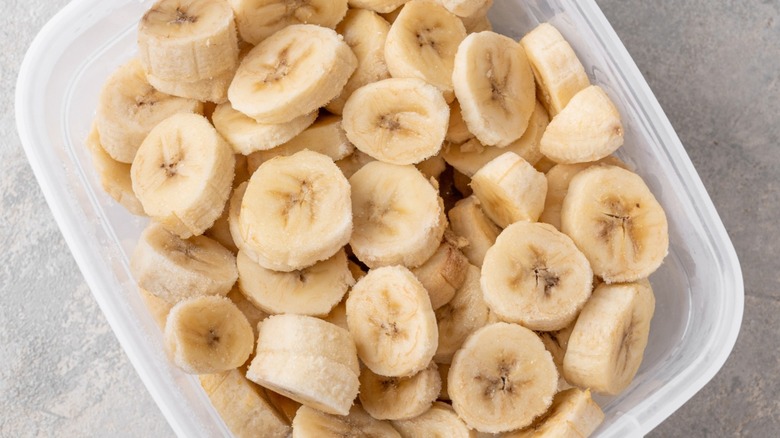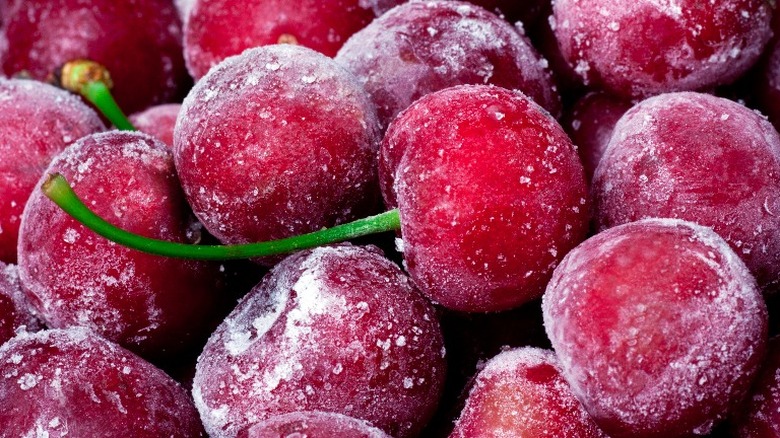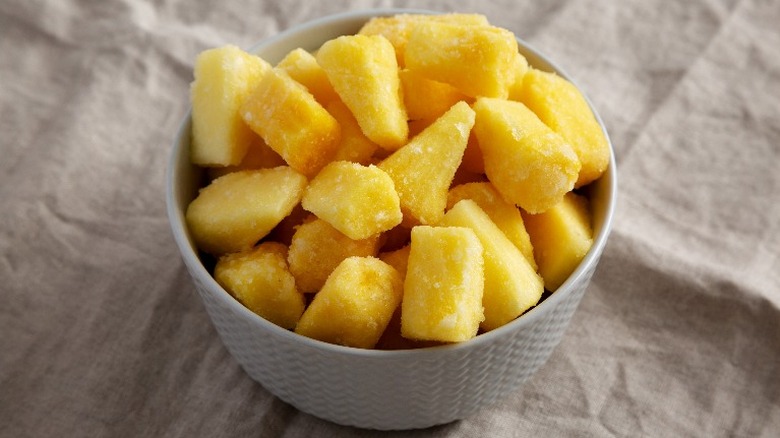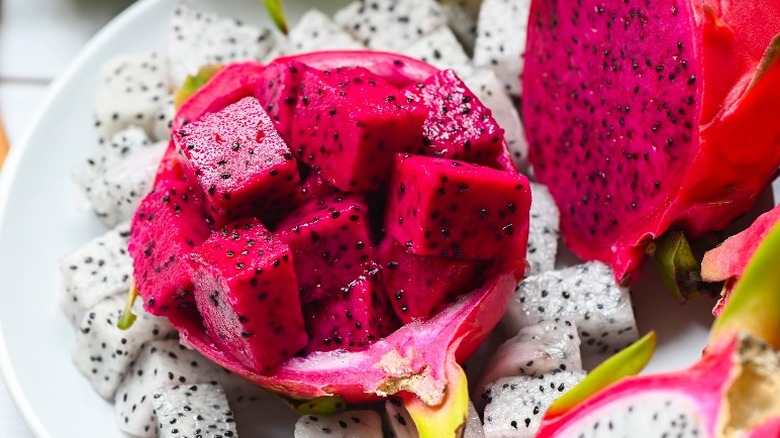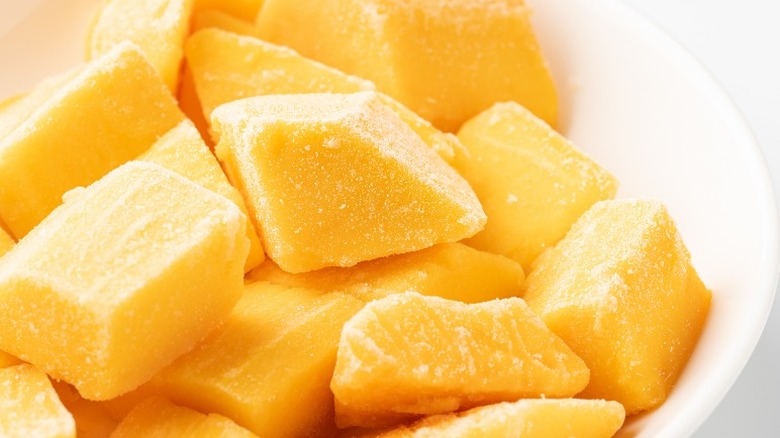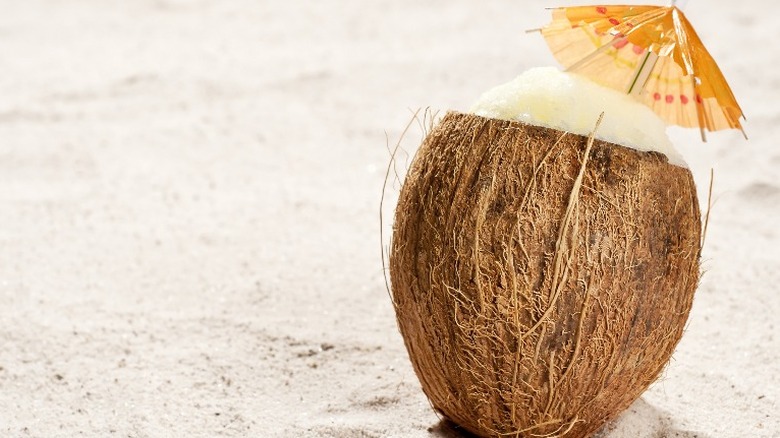10 Fruits You Should Buy Frozen
It's always a bummer when you suddenly find all that lovely fresh fruit you just purchased covered in mold. It would be great if we could spend the day at the farm, orchard, or local market picking out colorful and perfectly formed fruits and vegetables to eat that night. But, with the weather, busy schedules, seasonal availability, and the aforementioned matter of fruity fermentation, that's not always a viable option.
That brings us to my favorite option of using frozen fruit rather than perusing the produce section. Frozen fruit is both an affordable and convenient way to add to your diet, and keep on hand, a variety of fruit all year round. It's an excellent way to bring a taste of summer to those bleak days of less-than-ideal winter weather. The fruits mentioned here were chosen from a combination of my own experiences and online reviews.
Most frozen foods keep all the vitamins and minerals of their fresh counterparts. Sometimes frozen foods even have more of those fresh-from-the-farm nutrients, as non-frozen fruits lose vitamins and minerals while they sit on the counter or rest in the fridge. The freezing process preserves all of these nutrients, making for delicious and nutritious snacks, smoothies, salads, and desserts.
1. Avocados
Yes, an avocado is a fruit. Avocados are single-seeded berries that are part of the same family as sassafras, the bay laurel, and some types of cinnamon trees. And, it may come as a surprise that avocados are available frozen. They are, and we're just as excited as you are. No more disappointment from picking up a mushy avocado that you purchased less than two days ago.
Aside from the convenience factor, buying avocados in a frozen state blocks your chances of picking out an imperfect piece of fruit. Since there's no added sugar or salt in bags of frozen avocados, it equals the same amount of nutritional benefits as fresh fruit.
You can find bags of frozen avocados, usually in chunks since whole ones can become rather mushy when thawed, from Welch's, Dole, Kroger's Private Selection, and Costco's Nature's Touch. Use these frozen cubes in, salads, grain bowls, toast toppings, and, of course, big bowls of guacamole for taco Tuesday and margarita Monday.
2. Berries
Whether it's strawberries, blueberries, or raspberries, frozen berries are as much of a treat on their own as they are in smoothies and milkshakes or as toppings on cakes, pies, and ice cream sundaes. But, are frozen berries just as nutritional as fresh berries? The answer is yes.
Most frozen fruit undergoes the freezing process soon after being harvested. This means that the fruit is fully ripened and in its most nutritional and tasty state. All of those vital vitamins, antioxidants, and minerals are locked in there. On the other hand, fresh fruit may have been harvested before becoming fully ripe and then artificially ripened during transport, which could be up to 1,000 miles before its final destination at the local grocery store.
Available in both sliced and whole varieties, you'll find frozen berries from Dole, Kroger's Simple Truth, Nature's Promise, Wyman's, and more. You can use these to make a wide array of treats and recipes, including blueberry pancakes, muffins, tarts, cobblers, scones, and zesty fruit-infused vinaigrettes.
3. Peaches
Low in calories, peaches are full of vitamins C, K, and E, which boost the immune system and help eyes and skin stay healthy. Peaches also aid in digestion and can help improve cholesterol levels. However, they don't always have the best shelf life. Invariably, you'll find a spot or two within a few days of purchase. This is where the magic of frozen peaches comes into play.
Frozen peaches are a delicious addition to smoothies, shakes, and other desserts. Top with a sprinkle of sugar, and they're a cool and refreshing treat. Like fresh and juicy pineapples, they're also amazing on the grill with a tender steak or flavorful cut of chicken. Plop some frozen peaches in the blender, add some Greek yogurt, steel-cut oats, or almond milk, and have a delicious smoothie. Best of all, no peeling and pitting is required.
Whether you prefer yellow or white peaches, you can find them all over the freezer section from brands such as Dole, Earthbound Farm, Welch's, and store-brand varieties. They're usually sliced, which only means more convenience and time-saving in the kitchen.
4. Bananas
Bananas are packed with potassium, vitamin C, and vitamin B6. While they make a quick and easy snack, these handy lunch box favorites don't have the most consistent of records for staying nice and yellow. There's invariably a brown spot or two, causing the entire family to run for the hills, thus avoiding said fruit until it really is past the point of no return.
Cue the blessings of the local grocer's frozen food section. Frozen bananas give amazing taste and consistency to smoothies, brownies, and shakes. If you freeze whole bananas, they are a terrific treat when dipped in chocolate.
A favorite of athletes and other on-the-go types, there are more than 400 varieties of bananas. The Cavendish is the one you're most likely to find in the grocery store. Mona Lisa, Goldfinger, and Ice Cream are just a few of the other fun and unique-sounding banana varieties. Banana plants have succulent stems and actually aren't really trees at all. They are considered herbs and are related to lilies, orchids, and palms.
The flavor and nutrition of frozen bananas are the same as fresh ones, and they won't rot in front of your eyes. You can purchase frozen bananas from brands like Great Value and Wegman's Organic.
5. Cherries
Cherries are an all-time favorite for oatmeal-based shakes and even as a snack all on their own. They make wonderfully sweet and juicy pies and can be baked into waffles, cookies, and brownies. The best part is that they're usually pre-pitted, which saves time and mess (and no more cherry juice spatters all over the counter) in the kitchen.
There are two varieties of cherries: sweet and tart. The sweet ones are mainly grown in California, Oregon, and Washington, while the tart ones hail from Wisconsin and Michigan. Bing, Lambert, and Rainier cherries are sweet, and Montmorency is the tart variation. Most pies, jams, and other baked goods use tart cherries. Sweetness comes from adjusting the amount of sugar used. Sweet cherries make a wonderful snack.
Cherries are a great source of vitamins C, A, and K. They also provide potassium, magnesium, calcium, and antioxidants. Purchase frozen cherries from brands such as Dole and Kroger's Simple Truth Organic for tasty cherry streusel tarts or a cinnamon roll cherry cobbler.
6. Pineapples
The bright and sunny disposition of the pineapple makes it a favorite year-round treat. As mentioned earlier, grilled pineapples are a deliciously sweet and unique accompaniment to anything you might make on the good 'ol barbecue grill. It pairs well with steak, pork, and chicken dishes.
Pineapples provide health benefits such as vitamin C, fiber, manganese, and antioxidants. They also aid in digestion. Despite all these benefits and the yummy factor, it can be intimidating to cut into that hard exterior of fresh pineapple, and canned pineapple is just not the same if you ask true pineapple aficionados.
Simple Truth Organic and Dole are go-to brands for the best-frozen pineapple chunks for smoothies, ice cream, and even tropical drinks. There's nothing better than a frosty pina colada or painkiller with a nice slice of pineapple garnish on a dreary winter day. Or even a crisp fall or sunny spring day. We don't judge.
7. Acai
The exotic, ultra-hip, and oft-mispronounced acai contains fiber, calcium, potassium, and vitamin A. With a taste somewhere between a blackberry and unsweetened chocolate, this interesting fruit makes a unique addition to smoothies, bowls, and pudding. Acai berries, which are about an inch in diameter, grow on acai palms in the rainforests of Central and South America. This only adds to their exotic persona.
Very similar to grapes and blueberries, fresh acai has a large seed, so using frozen acai offers the convenience of a pit-free experience. Fresh acai berries have a very short shelf life and are typically pressed into a paste and sold either frozen or dried.
Wegman's Organic frozen acai includes acai chunks and blueberries for an extra bit of berry flavor. Another method of enjoying acai is by purchasing acai puree and blending it into smoothies, shakes, or whatever you like. Sambazon Organic and Pitaya Foods are just a couple of brands that sell frozen acai puree.
8. Dragon Fruit
Dragon fruit, also known as pitaya, has that exotic sound you just have to try. Plus, it's one of the coolest-looking fruits in the produce section. Fresh dragon fruit will last for about a week on the counter, maybe a little longer in the fridge. Once cut into, though, it doesn't last very long. This is where the frozen section of the local grocery store becomes your friend.
Frozen dragon fruit is available from Pitaya Foods and Target's Good and Gather. High in potassium, vitamin C, and magnesium, it's a wonderful way to add tropical flavor to smoothies, salads, bowls, and protein shakes.
Native to Central and South America and Mexico, the dragon fruit plant is a cactus. It can be found growing outdoors in warm and sunny environments like Florida and South Texas and makes a stunning statement plant. The fruit has a bright red and spiny outer skin and a white inside accented with tiny black seeds, similar to a kiwi. The flavor is also similar to a kiwi or a pear.
9. Mango
If you've ever been frustrated trying to peel and cut a mango, all the while avoiding that pit-like center, you're going to love the convenience of frozen mangoes. Bursting with vitamins A, C, and K, mangoes offer fiber, antioxidants, and potassium that can help with blood pressure control, aid in weight loss, and prevent heart disease.
Use mangoes in smoothies, as salad toppings, pureed over ice cream, added to iced tea, in a warm bowl of oatmeal, or blended into frozen drinks. A splash of rum, a bit of triple sec, and a drizzle of lime juice are the perfect combination for a refreshing frozen mango daiquiri.
While India is the top producer of mangoes worldwide, they also grow in Southern California and Florida. Frozen mangoes are available from Great Value and Simple Truth Organic. Dice into cubes for a sweet addition to salsa, toss into a spicy shrimp bowl, blend into an Indian mango lassi, or combine with coconut milk and sticky rice for an authentic Asian dessert.
10. Coconuts
Coconuts are one of those indelible images that always seem to send our thoughts to tropical islands and soft sandy beaches. As much as we would love to bring that picture to life every single day, fresh coconuts are hard to find in local grocery stores even when they're in season. Frozen coconut, however, can be found and used year-round. And, you don't have to use every ounce of energy in your body, or sketchy knife-wielding skills, to crack it open.
Coconut offers the benefits of fiber, manganese, potassium, and iron. It aids in enzyme function, fat metabolism, bone formation, and heart health. Plus, it's just plain delicious. Whether using the meat or the fluffy shavings, coconut is used in macaroons, coconut cream pie, overnight oats, coconut-coated shrimp, German chocolate cake, and tropical cocktails.
Purchase frozen coconut meat from Copra Organic or Genuine Coconut. You can also find a blend of frozen mango, pineapple, and coconut chunks from Target's Good & Gather brand, which is an excellent way to get all the ingredients for a pina colada or fruit salad in one go.
